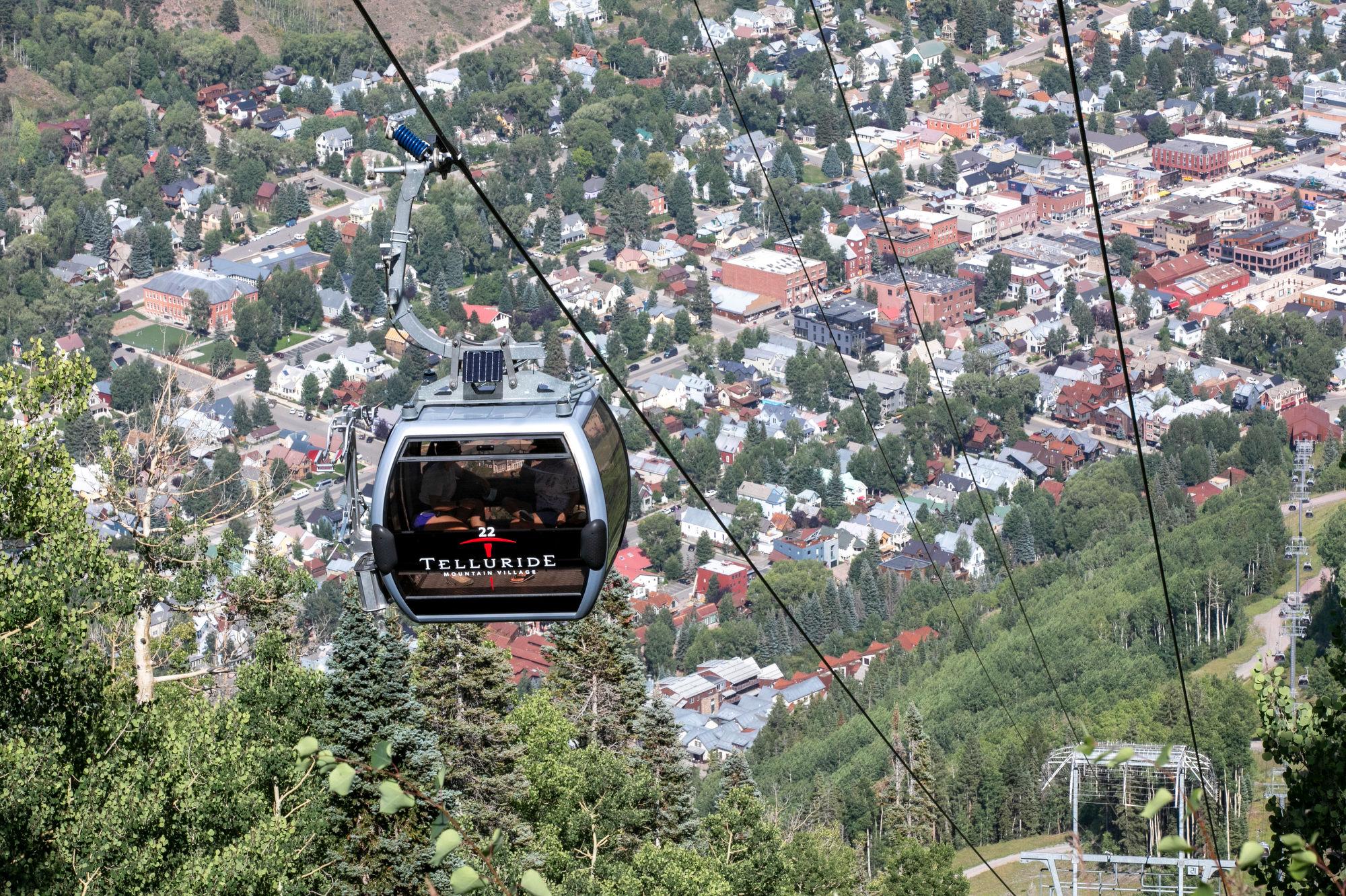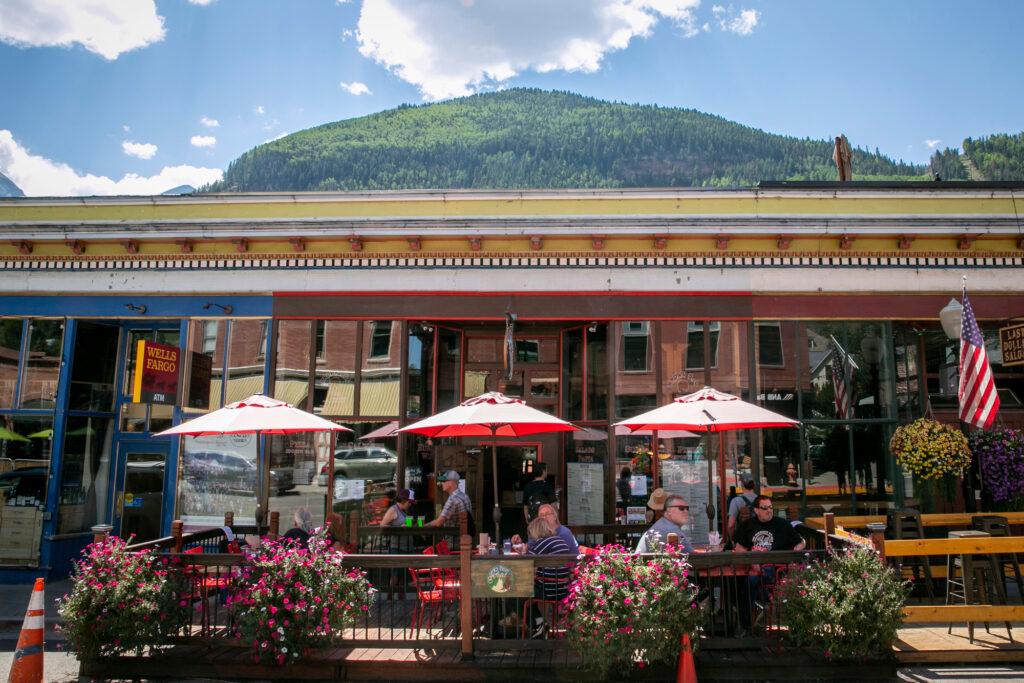
Glitter. The mines in the San Juan Mountains were once rich with mineral deposits: gold, silver, zinc, lead, copper. All kinds of metals were once mined from the mountain near Telluride.
In the 1970s, though, as the mines dried up and closed, the town traded the lustre of those precious metals for the glitterati of Hollywood as the Telluride Film Festival got bigger and bigger.
The 48th edition of the fest is underway. But how did a small mining town in Colorado become one of the biggest stops for Oscar contenders?
Writer Phillip Lopate remembers the Telluride Film Festival as it once was. An attendee of what he calls the festival’s maiden voyage, his stories are filled with brushes with famous names, like the time he rode in an elevator with silent movie star Gloria Swanson, hung out with Serbian director Dušan Makavejev and hiked with actress Julie Christie.
“It was a chance to get a glimpse of what these people were like in human terms,” Lopate said.
It was an unlikely pairing, celebrity and this old mining town. Telluride is hours from the nearest metropolitan area, and its history is not exactly one that typically attracts the attention of the biggest stars in film.
As Telluride's years as a mining hub waned, its festival era began
Molly Daniel is a researcher at the Telluride Historical Museum. She said Telluride’s boomtown years as a mining hub ran from the 1890s to the 1970s, when the town’s last mining company closed its doors. The people in town were changing; miners left seeking other work. That left a gap.
“So there was a demographic shift happening in the 1970s,” Daniel said. “We had the ski area open in 1972, which definitely started to make it more of a tourist destination and less of a mining community.”
Daniel says many of Telluride’s other famous festivals also sprang up in this era.
“The bluegrass festival had its first year in 1973. So that's a year after the ski area opened and it's kind of our other huge festival in addition to the film festival,” she said. “Then the jazz festival was in the 70s. It would have been a very exciting time to be in Telluride. I wish I was there.”
As for the film festival, it was just a small group that put its first event together for Labor Day weekend 1974. Its organizers included Denver-based Bill and Stella Pence, who worked for the art house label Janus Films and owned a small chain of movie theaters in Colorado.
Others that helped with that first iteration of the festival included James Card, who brought his silent movie expertise and collection from the George Eastman House, and Tom Luddy of the Pacific Film Archive who added a counterculture spirit from San Francisco.

Word spread, and the festival grew
After that first festival, word about it traveled through the film community over the next few years.
“It was just like, it was like something in the wind,” said former LA Times film critic Kenneth Turan. “What other festival people would just say [was], ‘Well, I hear there's this little festival in Colorado. It's pretty good.’”
A few years after Turan’s first visit to the San Juan Mountains, film critic Leonard Maltin and his wife Alice decided to treat themselves to a festival getaway. That year, 1979, the festival paid tribute to French director Abel Gance. Maltin caught an outdoor screening of one of the director’s most famous movies, “Napoleon.”
“Showing the film at proper silent speed and sitting outdoors in the mountain air, by the time it got to be midnight or 12:30 a.m., the poor pianist's fingers were freezing,” Maltin said. “And so were we. We tried to sit it out and we just couldn't do it.”
There have been many more tributes over the years, and with them many more memories of famous faces and names talking about their careers and sharing their lives’ stories. This year’s festival is honoring Oscar-nominated Riz Ahmed, Oscar-winner Jane Campion, and Emmy-winner Peter Dinklage with tributes.
Like the town around it, the Telluride Film Festival started to change after its first initial years. Passes became more expensive. More venues were added to accommodate larger crowds. A pass to the first festival was only $25 and $10 for locals; now it starts at almost $400 and goes up to almost $5,000.
The changes were not just palpable in cost, however, but in how and why films were screened. Former Denver Post critic and reporter Lisa Kennedy said she felt the event started a new chapter one year she was covering the festival.
“I think that people may mark that very special year of Slumdog Millionaire as being a kind of turning point,” Kennedy said. “All of a sudden the awards season has become this sort of frenzy thing that is introduced and vied for by film festivals.”
- While Tourism Booms in Telluride Because Of Its Recreation And Festivals, Its Housing Market Is At A Crossroads
- At The Telluride Film Festival, Volunteers And Gig Workers Prepare For A Return To Normalcy — And Their Annual Traditions
- As The Telluride Film Festival Makes Its In-Person Return, Other Fests Consider Their Own COVID Safety Rules
Telluride is a premier festival now, but it's still laid-back
It was that shift that helped Telluride get really big. It’s now one of the fall’s premier film festivals, and as a result, has put a target on its back for other festivals who want to share the spotlight. Turan said he remembers when the competition between Telluride and its calendar neighbor, the Toronto International Film Festival, got really competitive.
“Toronto got irked at Telluride at one point in time. They said, ‘If you want to be one of the best slots of Toronto, you have to pass up Telluride,’” Turan said. “Because they felt that Telluride was eating its lunch, that a lot of the early buzz about the film would come from Telluride.”
The Telluride Film Festival has changed, yes, and this year marks a whole new beginning as organizers deal with putting on an event during a pandemic. Some things will change, like registering with your vaccine card and wearing masks inside theaters, but many people still know Telluride as one of the more laid-back and welcoming festivals in the world.
“It's the only festival I can think of that you can bring your family to,” said New York Times film critic A.O. Scott. “I brought my kids from when they were little, and they're grown now.”
Leonard Maltin’s daughter, Jessie Maltin, started attending the festival with her parents when she was 2-years-old. She, too, recalls the festival’s small feel, despite the global eye cast upon it.
“There are no paparazzi, there are no red carpet premieres,” she said. “Everyone is at ease, and a lot of celebrities come with their kids because they can.”









